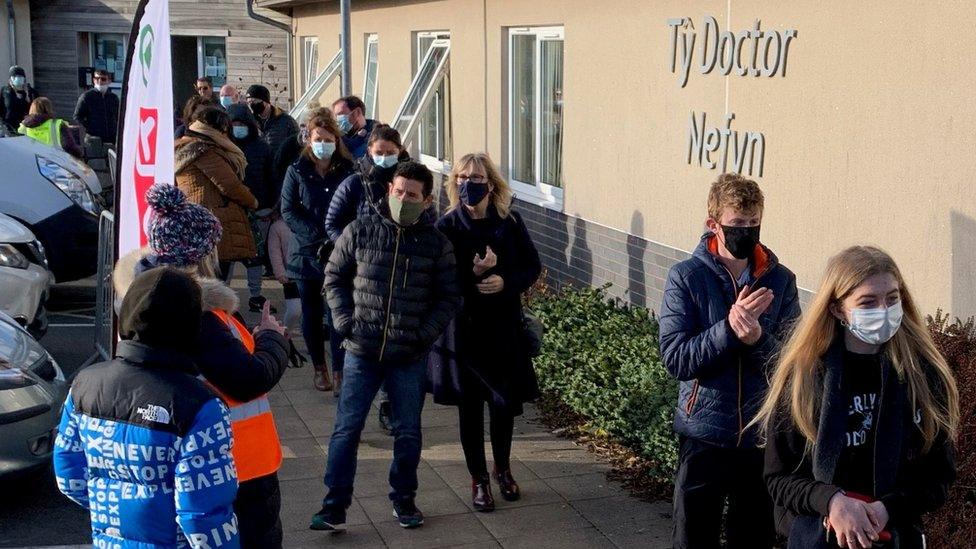Omicron: Wales plans to offer all adults booster jabs by end of year
- Published
- comments
Drakeford: Boosters 'vital' for fighting Omicron
The Welsh NHS plans to offer all eligible adults a booster jab by the end of the year if it can, First Minister Mark Drakeford has said.
His announcement in a televised address came as the number of Omicron cases in Wales doubled from 15 to 30.
It follows a similar booster target for England from Prime Minister Boris Johnson at the weekend.
Mr Drakeford warned of new restrictions and said ministers may "need to take more steps to keep Wales safe".
Mark Drakeford is expected to confirm if changes are needed to the coronavirus regulations this Friday.
Earlier on Monday, the Welsh government confirmed a patient with a confirmed case of the Omicron variant of Covid was admitted to an un-named Welsh hospital.
Wales' chief medical officer Dr Frank Atherton warned the Welsh government may reimpose rules to reduce people mixing, and Mr Drakeford has indicated that there might be tougher Covid restrictions after Christmas.
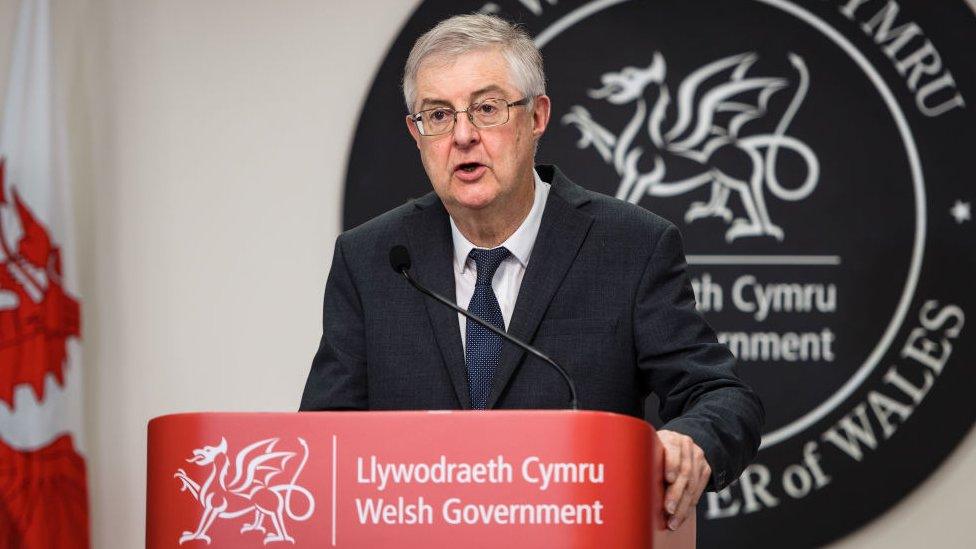
But the Welsh Conservatives said no new restrictions would be needed if a "critical mass" of people get boosters.
Boosters are being offered to adults in the UK three months after their last dose, under plans to speed up the vaccination programme.
In a speech aired on BBC One Wales, Mr Drakeford said Wales must be prepared for cases "to rise quickly and very steeply".
He said Omicron posed a "very serious situation" and by the end of the month "Omicron will have become the dominant form of the virus, bringing a new wave of infections and illness".
As two doses of a vaccine cannot provide enough protection, Mr Drakeford said a booster is "vital".
He added: "Urgent efforts are now underway to accelerate the programme even further so that we can offer all eligible adults an appointment by the end of this year, if at all possible".
Tougher restrictions after Christmas?
Further details are expected from Health Minister Eluned Morgan at a press conference on Tuesday morning.
On ITV Wales, Mr Drakeford said there "may be a period in the post Christmas days, when we can do more to stem the flow of the Omicron variant".
"But in this business, what will happen in three or four weeks time is a very, very long way away and we will certainly know a good deal more by then about just how serious this new variant is".

There are fears Omicron could fuel a rise in hospital cases through the Christmas period
Tories oppose new restrictions
Welsh Conservative health spokesman Russell George said: "We do not need more restrictions if a critical mass of people get their jabs.
"There is a duty on all those eligible to get their vaccination and the Labour government has a responsibility to deliver the rollout rapidly. A free society and an open economy depend on it."
Plaid Cymru's Rhun ap Iorwerth said: "Our NHS must be given the support and resources it needs to roll out the booster vaccine as a matter of absolute priority with walk-ins expanded to ensure the majority of the population is boosted by the new year."
He added reports "we may be running out of lateral flow tests are deeply concerning and could not have come at a worse possible time".
What rules could return in Wales?
Dr Frank Atherton told BBC Radio Wales Breakfast that the ability of the variant to transmit faster than Delta "means that we just cannot afford to have huge gatherings of people this time of year because that will drive this wave of community transmission".
Asked whether there could be new restrictions over Christmas, he said: "We have to look at population mixing.
"So it's almost inevitable that... ministers will have to consider whether measures to reduce population mixing are needed at this point in time".
He said that included a possible return to household bubbles.
But Dr Atherton said he was not "envisaging we would need to go into a full national lockdown".
Wales previously had rules restricting contact in private homes to an "extended household", known widely as bubbles, before the rule was replaced by the later ditched rule of six.
Controversies 'could hit compliance'
Swansea University behavioural scientist Dr Simon Williams feared recent political controversies will have "no doubt" impacted people's willingness to comply with Covid rules.
Expressing concern over how much people will follow new rules, he said: "People are I think a little more weary".
"You certainly can't take the amazing compliance we've seen over the last maybe two years for granted," he said.
A virologist expressed concern at evidence from South Africa that suggested Omicron is "re-infecting people who have had other variants".
Dr Naomi Forrester-Soto told BBC Radio Wales Breakfast: "If more people don't get their booster... the number of people who could get infected is very high."
Schools on Anglesey will reintroduce blended learning for the last three days of term, after Covid levels soared within the county.
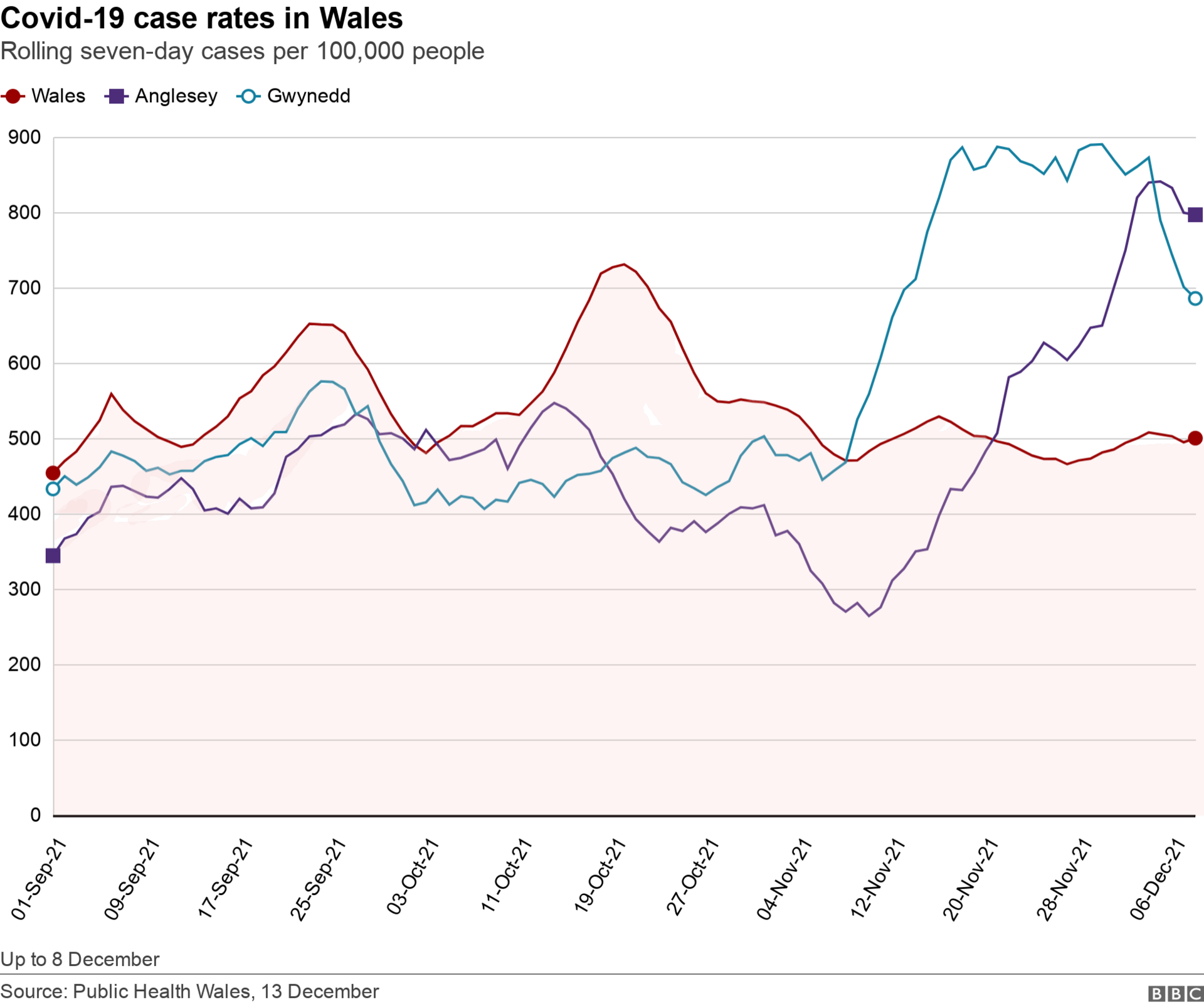
Anglesey has highest case rate
Anglesey has the highest case rate in Wales - and the 11th highest in the UK - with case numbers, along with neighbouring Gwynedd, driven by the under 25s.
Both counties have seen a fall in recent days, although the Welsh average daily case numbers are slightly up and 3% higher than a week ago.
Latest hospital figures still indicate a downward trend, with numbers of confirmed Covid cases in hospital beds 23% down on two weeks ago, and numbers in critical care are also falling.
But overall acute hospital beds are 89.9% full.
Deaths are averaging five a day - a fifth of the number seen this time last year, before the vaccination programme had got under way.
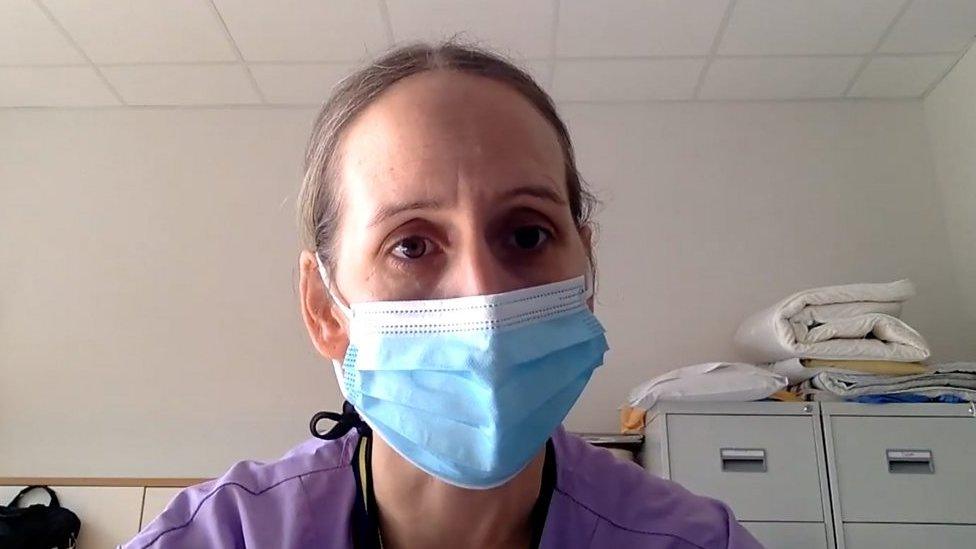
Intensive care consultant Dr Ami Jones said hospitals are already struggling
Intensive care consultant Dr Ami Jones told BBC Breakfast her hospital "is bursting, we're really struggling" and issued a plea to people to get their booster and "not take any risks".
"Looking forward into winter and looking at Omicron coming, we wonder how we're going to cope.
"Everyone's pretty broken and tired, it's been a tough couple of years... we're all looking at each other wondering how we're going to get through this year.
"Is the NHS going to be in one piece at the start of next year?"

THE GRANDEST OF DESIGNS: The man who took on a mansion
EXPLORE WALES : The very best of welsh nature and exploration

- Published1 July 2022

- Published9 December 2021
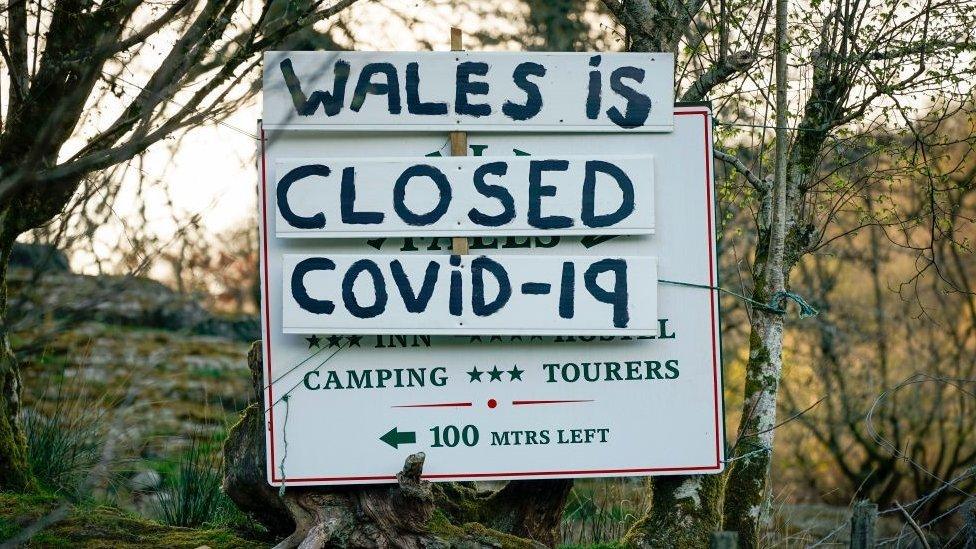
- Published10 December 2021

- Published5 December 2021
